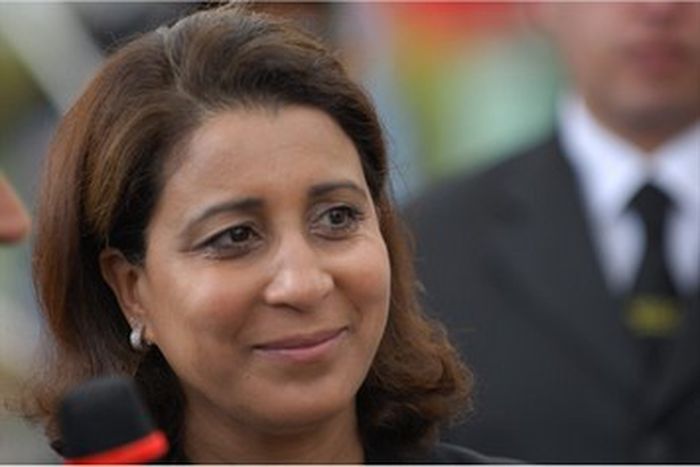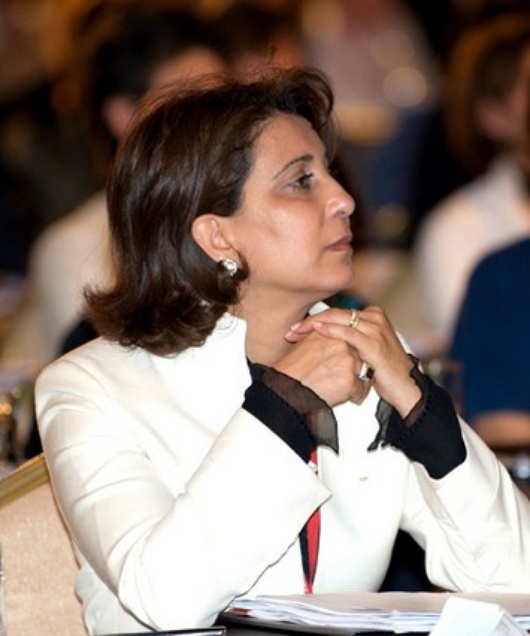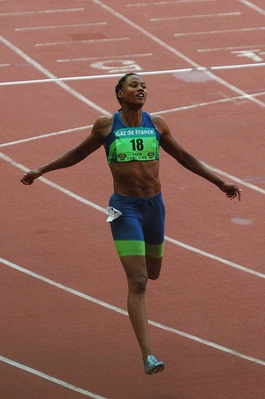
Nawal El Moutawakel: ‘girls think that sport is a macho world’
Published on
Translation by:
Helen SwainThe former Moroccan women's track hurdler and current youth and sports minister says nobody wants to change. Interview
 Think ‘women’ and ‘sport’, and the name ‘Nawal El Moutawakel’ is not far off. The 46-year-old is the first woman from a Muslim country to win an Olympic medal, and the first athlete ever to bring a gold medal back to Morocco. Legendary! It would appear that Nawal El Moutawakel likes symbols. In 1995, she became a member of the International Olympic Committee (IOC). At the Olympic Games in Beijing in 2008, she became the first Muslim woman to sit on the IOC executive commission. She has been the minister for youth and sports in Morocco since October 2007. In an interview done in the Women and Sport scientific journal for the sport and citizenship association, who believe that sport and its different values should be considered essential vehicles for education and citizenship, she develops on how ‘only the impossible is impossible’.
Think ‘women’ and ‘sport’, and the name ‘Nawal El Moutawakel’ is not far off. The 46-year-old is the first woman from a Muslim country to win an Olympic medal, and the first athlete ever to bring a gold medal back to Morocco. Legendary! It would appear that Nawal El Moutawakel likes symbols. In 1995, she became a member of the International Olympic Committee (IOC). At the Olympic Games in Beijing in 2008, she became the first Muslim woman to sit on the IOC executive commission. She has been the minister for youth and sports in Morocco since October 2007. In an interview done in the Women and Sport scientific journal for the sport and citizenship association, who believe that sport and its different values should be considered essential vehicles for education and citizenship, she develops on how ‘only the impossible is impossible’.
How can sports favour equality between men and women in our society?
 Because it is relevant to all the populations of the world, sport is above all a means for promotion and development. It is a fundamental right in which discrimination and segregation have no place. Sport has phenomenal qualities both for men and women: it brings them together in solidarity, fraternity and equity, which, unfortunately, is not always the case at the moment. However, many institutions and governments are working in this direction, to reflect the sport's true values: building connections, excellence, determination and effort in joy.
Because it is relevant to all the populations of the world, sport is above all a means for promotion and development. It is a fundamental right in which discrimination and segregation have no place. Sport has phenomenal qualities both for men and women: it brings them together in solidarity, fraternity and equity, which, unfortunately, is not always the case at the moment. However, many institutions and governments are working in this direction, to reflect the sport's true values: building connections, excellence, determination and effort in joy.
What national and international efforts could promote women accessing positions of authority?
Women constantly have to struggle to attain positions like this, generally held by their male colleagues. Today, some bodies try to help women to obtain responsibilities like this. There is a general call for change; but while everyone wants change, nobody wants to change …
Nevertheless, since the nineties, numerous authorities have organised world conferences around the theme ‘women and sport’. The centenary Olympic congress debate in 1994 in Paris was largely devoted to the question of women. This movement is starting to get things moving and allowing women's voices everywhere to be heard.
On the sports tracks, women have shown that with determination, perseverance and courage, they can beat records and pulverise the performances previously held by men. Backstage, they now want the same responsibilities as men. The proportion of women in sport has gone from 10% in the nineties to 20% now, only a few years later. Some institutions maintain this proportion. Others have not yet caught up, but the winds of change and modernisation can be felt in high places.
‘The future of sport is feminine’
This change in direction is very important, especially for young girls, because they still too often perceive sport as being a ‘macho’ world dominated by men. Nevertheless, women are increasingly present, sitting on executive committees, taking responsibility for the presidency of different commissions or work groups and becoming ministers. This is a very positive change for women, as well as for the world of sport. I am deeply convinced that the future of sport is feminine. I hope that society will change in the same way.
European institutions are hard at work on these questions through various political and legal instruments such as the white paper on sport or the ‘sports article’ of the Lisbon treaty. According to the white paper, the European commission must encourage integration, equality between the sexes, access to sport for women, particularly those belonging to ethnic minorities, and access for women to positions of authority. As the minister for youth and sports in Morocco and IOC member, do you follow up on these issues?
Even from afar, we are very much aware of what happens in Europe. We encourage all innovations and initiatives. When it is a question of north-south co-operation, we are obliged to follow what is happening in the north. We take inspiration from these initiatives and examples to breathe new life into what we are trying to do here. Today, it is impossible to develop a project that marginalises women.
The white paper on sport is a good example for many organisations, governments and entities; it shows that everything is possible, and only the impossible is impossible. Today, when we exa mine the millennium development goals (MDG), we can see the importance given to women's issues by international institutions. By eliminating marginalisation, poverty, misery and other scourges, by encouraging insertion and self-confidence, sport participates in the emancipation of women, who are often the most affected by these problems. They are wives, mothers and women all at once, and they are often exposed to poverty, exclusion and marginalisation. Sport is able to transcend those problems. Therefore, it is necessary to encourage the development of sport: to this end, the white paper is an excellent guide, likely to be adopted by many societies.
mine the millennium development goals (MDG), we can see the importance given to women's issues by international institutions. By eliminating marginalisation, poverty, misery and other scourges, by encouraging insertion and self-confidence, sport participates in the emancipation of women, who are often the most affected by these problems. They are wives, mothers and women all at once, and they are often exposed to poverty, exclusion and marginalisation. Sport is able to transcend those problems. Therefore, it is necessary to encourage the development of sport: to this end, the white paper is an excellent guide, likely to be adopted by many societies.
Translated from Nawal El Moutawakel : « Les filles perçoivent trop souvent le sport comme un monde macho »



